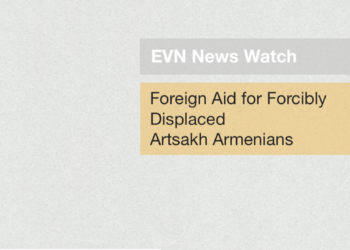
After Azerbaijan imposed a blockade on Artsakh in December 2022, Armenia’s Government formed a special working group to address the humanitarian concerns of the population. This subsequently transitioned into a “Humanitarian Center” that was set up near the Kornidzor settlement in Syunik region at the entrance of the Lachin Corridor. Following Azerbaijan’s large-scale attack against Artsakh on September 19, the Humanitarian Center was tasked with the responsibility of effectively managing the reception and urgent accommodation needs of the Armenians forcibly displaced from Artsakh.
Prior to the attack that precipitated the mass exodus of the Armenian population, the Humanitarian Center had begun providing services near Kornidzor with the objective of uniting the efforts of international organizations and human rights groups that were trying to assist in overcoming the humanitarian crisis in Nagorno-Karabakh, to report the situation to the international community, and to support the work of foreign media trying to cover the situation. The Government allocated 15.9 million AMD on September 22 from its reserve fund to implement the work of the Center.
On September 26, Deputy Prime Minister Tigran Khachatryan, coordinator of the Humanitarian Center, announced that the government had prepared an inventory of guest houses and hotels in all regions of Armenia, where they can accommodate forcibly displaced people.
As of October 9, the number of people forcibly displaced from Nagorno-Karabakh is 100,632, of which 99,632 (more than 98%) are registered with the Government. More than 50% of the registered persons were placed in state-provided shelters, as well as benefiting from other government social assistance programs. The e-soc.am website is available for the assessment of primary needs. However, authorities say it is also very important to go through the registration process, which is being carried out by the Migration and Citizenship Service of the Ministry of the Internal Affairs. Additionally, refugees can register in the local communities where they are currently staying. Registration is an important precondition for the full use of government support.
Finances
The Ministry of Finance has opened a treasury account number – 900005002762 – for donations in any currency by people living in Armenia and abroad.
The government has already approved the decision and procedure for providing one-time support of 100,000 AMD to each person forcibly displaced from Nagorno-Karabakh. Thus, people who have bank cards will start receiving assistance, and those who don’t can open an account (free of charge) at any bank (except Mellat and Fast banks), after which they will be able to receive the benefits. After opening a bank account, there is no need to submit it to the Unified Social Service. Each adult must have their own card account to which the assistance will be transferred to.
In the case of minors, it is necessary to access the platform of the Ministry of Labor and Social Affairs, where the minor’s parent or guardian must fill in relevant details including the child’s birth certificate, so that these are linked to the parent’s or guardian’s data and the money is transferred to the their account.
Persons over 75 years of age, as well as persons with disabilities who do not have a bank card, can receive support in cash from Haypost (through the postman, if necessary) with relevant identification.
According to another program, each forcibly displaced person will receive 40,000 AMD from the state to rent an apartment and 10,000 AMD for utility costs. The funds will be transferred through the bank and only for those who do not own property in Armenia.
Education
Of the forcibly displaced from Artsakh, 21,266 are schoolchildren. The Ministry of Education, Science, Culture and Sports (MESCS) has said that parents can get information about currently available vacancies in public schools in Armenia through the license.emis.am platform.
“Our schools are ready… a letter was sent out with clear instructions on the organization of the process. In particular, there won’t be any obstacles in terms of documents,” said MESCS Minister Zhanna Andreasyan, adding that regulations have been put into place for those children who will need additional support.
As for the students, MESCS reported that the Higher Education and Science Committee of the Ministry has sent a letter to state colleges and universities to help ensure that forcibly displaced students can continue their education without further disruption by enrolling them in appropriate courses in their relevant major.
Extracurricular activities for students such as cultural and sporting events are also being addressed. There were 11 sports schools with 3000 students in Artsakh.
Psychological counseling and support is also available for the forcibly displaced children from Nagorno-Karabakh and their families.
Healthcare
On September 26, the Ministry of Health announced that the state will cover medical care and services, including hospital care, for the forcibly displaced from Nagorno-Karabakh. Refugees are asked to register at a primary healthcare medical facility near their place of residence (outpatient clinic, polyclinic) to receive services. Medicine will also be provided free of charge on an outpatient basis.
Starting from October 5, mobile teams of the Ministry of Health are making visits throughout the country to conduct primary medical examinations, collect necessary information to assess needs and provide more targeted solutions to them in the future.
The Ministry has also set up a hotline – 8003 – for those who require medical attention. Those who have any questions about medical care and services can contact the Ministry through their Telegram channel.
Jobs/Work
To assist with employment, the Ministry of Labor and Social Affairs launched a platform www.workforall.am.
The Ministry of Education, Science, Culture and Sports informed that teachers from Nagorno-Karabakh can submit their information to [email protected]. After the data collection, additional support programs will be organized to ensure their inclusion in the educational system. Vacancies in schools in Yerevan and other regions of Armenia are also regularly published, and teachers can contact the Ministry’s hotline: 010599600.
On September 29, the National Institute of Health of the Ministry of Health started the registration of forcibly displaced medical workers from Nagorno-Karabakh, after which the process of providing them with work in various medical institutions of Armenia will begin. The Ministry reports that the registration has no deadline, and for more details, individuals can call 096144083.
It is noteworthy that the programs are extended to people affected by the military attack of September 19-20 and those who were forcibly displaced to the Republic of Armenia after September 24.
The 114 hotline was also launched and all the government programs can be found through the irazekum.am website.
The Ministry of Labor and Social Affairs has launched the “Map of Social Support Services” – map.socservice.am – in order to bring together all existing resources of international structures, non-governmental organizations and social initiatives willing to support people forcibly displaced from Nagorno-Karabakh. The ministry is also recruiting volunteers through the website kamavor.mlsa.am.
Editor’s Note: This article will be periodically updated to reflect new pledges of aid and assistance to the forcibly displaced Armenians of Artsakh.
News Watch
Spotlight Artsakh
Podcasts
This Is Genocide
California Superior Court Judge Gassia Apkarian, an advisor to the Center for Truth and Justice (CFTJ), says that the forced deportation of the Armenians of Artsakh (Nagorno-Karabakh) by Azerbaijan constitutes genocide. The CFTJ, created in the aftermath of the 2020 Artsakh War, oversees the collection of firsthand testimonial evidence from survivors of war through in-depth, recorded interviews to be a living memorial to crimes against humanity, for study, education and legal action.
Read moreThis Must Be Our Last Catastrophe
Former Member of the National Assembly of Turkey, Garo Paylan is in Armenia to meet with the forcibly displaced Armenians of Artsakh (Nagorno-Karabakh) who were ethnically cleansed from their ancestral homeland following a 9-month blockade and a large-scale military attack on September 19 by Azerbaijan. Paylan speaks about the need for unity as the Republic of Armenia is now facing an existential threat by both Azerbaijan and Turkey.
Read moreHumanity in Times of Darkness
Communications Manager and Spokesperson for the International Committee of the Red Cross (ICRC), Zara Amatuni, speaks to EVN Report about the work of the ICRC following the mass exodus of the indigenous Armenian population of Artsakh (Nagorno-Karabakh) after Azerbaijan's large-scale attack, the challenges facing the forcibly displaced who are now in Armenia and the fate of the missing.
Read moreHelping the Forcibly Displaced Journalists of Artsakh
Vladimir de Gmeline, a crisis director with Reporters Without Borders, is in Armenia to assess the needs of the displaced journalists from Artsakh after Azerbaijan’s large-scale attack that led to the ethnic cleansing of the entire Armenian population of Nagorno-Karabakh. Reporters Without Borders is a global organization defending the right of every human being to have access to free and reliable information.
Read more





